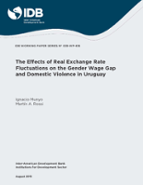The Effects of Real Exchange Rate Fluctuations on the Gender Wage Gap and Domestic Violence in Uruguay
Date
Aug 2015
In this paper, we bring to light the experiences resulting from the significant depreciation of the Uruguayan real exchange rate between 2002 and 2003, followed by an equally considerable appreciation between 2004 and 2010. We explore the link between these fluctuations and the incidence of domestic violence taking place in Uruguay. The real exchange rate is a measure of the relative price between tradable and nontradable goods. While men are traditionally employed in tradable industries, such as manufacturing, women are more likely to work in nontradable industries, such as the service sector. A change in the real exchange rate, therefore, can affect the potential wages of men differently from those of women. In line with the models that represent household bargaining, an increase in the real exchange rate can generate an increase in the bargaining power of men relative to that of women within the household. We present evidence that it raises the frequency of domestic violence. This holds true in rich and poor areas of the city.




